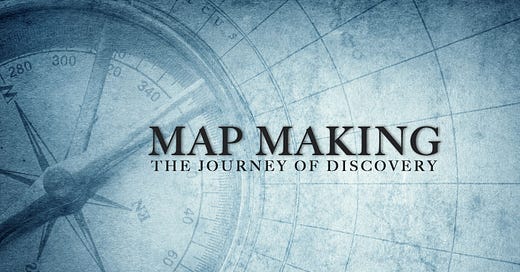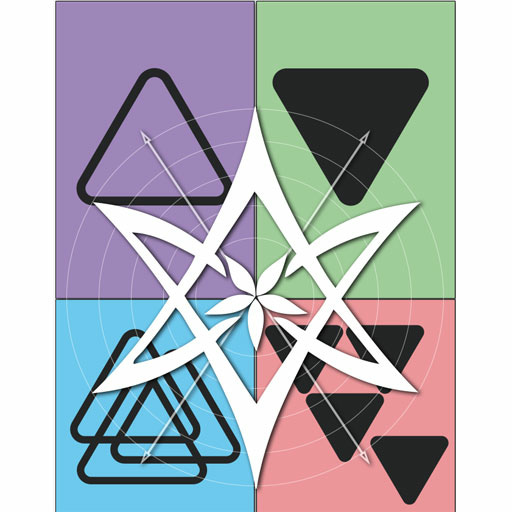Map Making: The Journey of Discovery is a monthly workbook-style newsletter for paid subscribers interested in an integral Thelemic psycho-spiritual approach to self-exploration.
Do what thou wilt shall be the whole of the Law.
I love making maps. I have since I was a kid. Even in my other life (of several “other lives” I lead) as a fiction author, I make maps of fantasy lands and dreamscapes for wild and strange characters to explore and find themselves. Other maps seem far more usual, almost disarmingly “normal” by all appearances—much like our own lives, actually, where the most dangerous aspects aren’t the spooks we pretend are under the bed but the mundane and monotonous dread we face every day.
Yet that’s the point of a good book, right? Any good narrative is about a character finding themselves in some way and facing change, right? It doesn’t have to be a major change for the character or even some universe-shattering revelation and catastrophic danger, but a good story is about a character moving through a sense of change in themselves and the environment in which they exist.
We are the same, as individuals, in our own universe that is wide open for our exploration, for our experience of, well, experience itself. Part of that experience is getting to know ourselves, the environment around us, and all the influences that push and pull us throughout our lives. Much of this we take for granted, but Thelema encourages us to live meaningfully, mindfully, and intentionally.
I’m starting something that I’ve never done before in public. I’m calling it Map Making: The Journey of Discovery. It’s based on a deficiency I’ve seen in a review of Thelemic literature since Crowley’s death—and quite frankly, even within Crowley’s corpus itself. Our prophet was great about giving soundbite pronouncements on what needed to be done along the path of personal insight and evolution, but he was terrible with providing the follow-through on those same pronouncements.
I think we need to understand who we are in a meaningful, mindful, and intentional manner. Rather than charge $400 to help you “discover your True Will statement”—whatever that’s supposed to mean—I’d like to offer a different plan that walks through a process of map-making that aligns with what Crowley said was the first step of the Great Work yet has been ignored by every published author since his death.1
There has never been a book published (that I’ve found) that even mentions this aspect of the Great Work. Yet, Crowley wrote that it was vital as the first step of the whole journey. So why is it that all these internet gurus, these experts who claim to be simplifying magick, and these high initiates of Orders who write books about their experiences never mention this first step if it’s so important?
I know I keep repeating that phrase. “First step.” It’s the phrase Crowley used. I want to beat it into your head. But I also want you to be aware of how much it is missing in all these books by leading authors and gurus out there. No one is talking about this “first step.” No one. Why? Ask them why they aren’t leading you to that first step first before they start selling you on all the other programs they offer.
My first A∴A∴ mentor is now deceased, but I remember when I first approached them back in the early 1990s, I was told they wouldn’t even consider me as a Student until I’d completed a cursory examination of myself and prepared a ‘map of my being’ so much as I understood myself at the time.2 It didn’t have to be perfect. It had to be honest. I had no idea what I was doing—frankly, I’m not sure they did either—but the point was to work through a self-inventory and come out the other side with something.
But it wasn’t just some psychological test. It wasn’t the Minnesota Multiphasic Personality Inventory (MMPI) or Myers-Briggs (MBTI) for Occultists or the Enneagram of Personality or sitting for an hour with a teacup on my head. I spent six months on it before what I turned in was good enough to say I’d “created a map” of myself that was workable as a start. By any standard today, I’d have tossed it and started over. But the total tonnage of what I know now about myself (and about the psyche) that I didn’t know then could stun a team of oxen in its tracks.3
Thelema offers an integral look at ourselves. It says the material is just as spiritual as the spiritual is material. There is no difference. Each aspect of ourselves is as sacred—if you like that word, and I do—as any other.
After many years, a whole lot of education, and even further discussions with that same mentor and other mentors along the way, and utilizing an integral model that I’ve come to view as holistically complete as possible, I’ve pieced together what I think is a pretty good framework for map-making.
It’s not the only map that could be made by someone starting out in the Great Work, of course. But it will cover all the relevant bases.
Though, in the end, it will be entirely your map.
And as much as you have to figure out the details of the map for yourself, it’s a journey we can still take together. It would be my pleasure to walk along this path with you if you let me. If not, then I hope this material is useful nonetheless.
Crowley commented that “the supreme emancipation [“from the constraints, accidents, and deceptions of material existence”4] is the same in essence for all.”5 This is really profound when you think about it.
I tell people that it’s like four people driving in the same car from Orlando to Los Angeles. They’ve all got the same map and are driving along the same road, but each of them will experience that trip very individually and see different details along the way. After all, we’re (mostly) looking out different windows of the same car, right?
When someone who hasn’t made the trip asks about it, each of the four will offer the same broad strokes of the journey while giving different details. It’s the identical broad strokes that tell us all that they’ve been on that particular journey, not the individual, personal details they’ve picked up along the way.
To be clear, this isn’t a workbook about how to “accomplish the Great Work.” If you use the resulting material toward that goal, awesome. If you merely walk away with a better understanding of yourself, that’s fine too.
Likewise, it has to be said—to keep the lawyers happy—that this is not therapy, therapeutic information, or even “pastoral/spiritual counseling.” The information in this series is for informational purposes only and is not a substitute for professional advice, diagnosis, or treatment.6
Map Making: The Journey of Discovery will be released on the second Wednesday evening of each month starting in June.7 The plan is to provide a bit of foundational material and then some homework. This isn’t just an academic review. It’s active work. Even if you have been on the path of the Great Work for a day or a decade, if you don’t have the first clue about yourself, or if you have been in the glow of the so-called “Holy Guardian Angel” for most of your life, this could be a journey you find useful nonetheless. Some of it will feel familiar if you have been through the A∴A∴ regimen in the past or through any kind of physical or mental training in a form of martial arts.
Finally, Map Making: The Journey of Discovery is a separate feature from the usual Integral Thelema material. You can unsubscribe or turn it off without affecting the regular Sunday issues.
Love is the law, love under will.
—Johnathon Victor Reese
And I do mean every author in the Thelemasphere. I don’t know a single author who has tackled this subject at all (though I know the moment I say this, I’ll be instantly corrected by half a dozen people).
I have heard stories of A∴A∴ mentors requiring mini-biographies and astrology charts, but the former is fairly difficult for most people, and the latter is just the Forer Effect (confirmation bias). But it is still something entirely ignored in books on the Great Work or setting off on “the path,” as best I can tell.
This is a play on a favorite line from “The Stackhouse Filibuster.” The West Wing. Directed by Bryan Gordon. NBC, March 14, 2001. My yearly rewatch of The West Wing coincides with much of my writing this Spring.
Crowley, Aleister, Mary Desti, and Leila Waddell. 1997. Magick: Liber ABA. Edited by Hymenaeus Beta. Weiser Books, 125.
Crowley, Aleister. 1989. The Confessions of Aleister Crowley: An Autohagiography. Edited by John Symonds and Kenneth Grant. Arkana, 240
More disclaimer: The information may not be applicable to everyone, and you should consult a qualified mental health professional for personalized advice. The information does not establish a therapist-patient relationship. No one should delay seeking professional mental health assistance in emergencies or when facing severe mental health issues. The information may not be accurate or complete. etc, etc, ad nauseam.
I don’t know how long this feature will run. I don’t have it mapped out—pun intended—and I’m writing this from years of notes and outlines, so I’m literally piecing it together as I go along without much rhyme or reason (yet) from what seems logical off the top of my head. But there is quite a bit of material here. Also, any feedback from you could alter how I move forward in any given area.






Hmm…interesting way of talking about it. The way I was taught this by my teacher was that the first entry in each volume of my diary should be “From Whence I Came”, giving my fullest possible explanation of “who I am and how I have come to be doing my present Work” and that this needed to be a sort of dynamic text I updated ongoingly as my insight increased.
I will admit that since I switched to digital journaling about five years ago I have fallen out of the practice, as I don’t have “volumes” in the same way as I once did, I just have OneNote. Perhaps it’s time to update. I have certainly changed a great deal over the last five years (I started transition around the same time…not living with perpetual depression/dysphoria brain changes a person).
Looking forward to digging in. You mentioned a monthly frequency. Are you looking at publishing around the 15th/mid-month?